Frank Tumwebaze, Uganda’s ICT Minister has apparently declared war on Ministry of Finance Permanent Secretary, Keith Muhakanizi.
The fight is about deals concerning who is the right entity to supply internet to all government agencies and departments.
Muhakanizi’s Thursday 14th September letter ordered all Government Ministries, Departments and Agencies (MDAs) to buy telecom services and internet from Uganda Telecom (UTL) and he gave reasons for that.
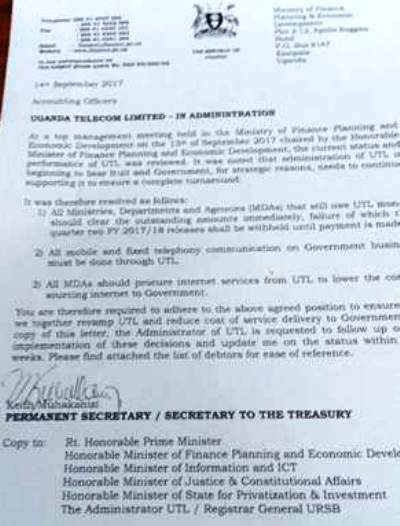
The order is in line with Buy Uganda Build Uganda (BUBU) policy which demands all MDAs to buy Uganda and Build Uganda.
Muhakanizi says MDAs, which every year spend over UShs35bn on internet expenses, can bring back UTL to life and make it the biggest telecom company in Uganda.
UTL badly wants this money to recapitalize and remain afloat because it’s now has very good management unlike before when Libyans were in charge.
Muhakanizi is the man who controls all MDAs budgets and says any MDA that ignores UTL will not get the next quarterly release.
This means every MDA must comply and they have three weeks only to respect Muhakanizi’s counsel or else they are finished.
MDAs are happy with Muhakanizi because NITA, which Tumwebaze is now defending, has been exploiting them by making super normal profits through a private company.
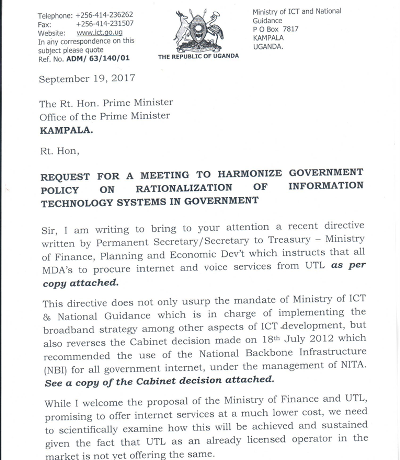
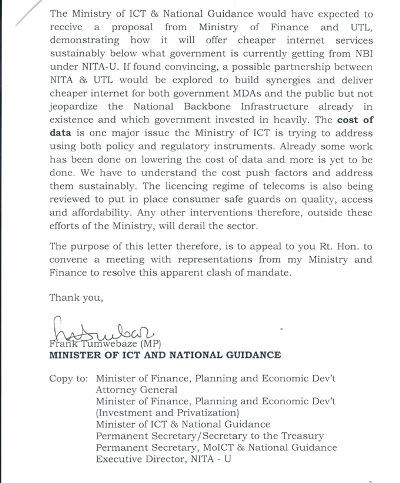
M/S Soliton Telmec Ltd is the company that has been making a killing from government.
The good thing is that MPs have also become interested and will be interrogating NITA bosses Saka, Vivian Dambya and Peter Kahiga concerning things that have gone wrong.
The ICT ministry officials, according to the MPs, will also have questions to answer for failing to supervise NITA.
SOLITON Eats Big
Reliable sources inside government say that for 2 years so far Soliton has been making huge profits from government.
They have a management contract and get management fees from NITA.
Expert sources have said that Soliton has been charging USD300 for every megabyte per second of which USD285 is profit because it costs them only USD15 to supply per megabyte to government MDAs.
Every month, Soliton makes not less than Shs10bn which is shared by those behind it.
They charge as high as USD1300 to fix just one manhole and James Saka, the NITA MD apparently just pays every invoice they bring without question.
Soliton helps NITA to deliver the internet to MDAs and to also maintain the Backbone Cable Infrastructure via which internet is delivered.
Therefore wherever there is problem with internet connectivity, they are called upon from their posh Nakasero offices to fix the problem which sometimes may require fixing broken manholes through which internet cables connect.
Sources say NITA bosses have been divided with many officials opposing Soliton huge charges.
Some even resigned protesting the high charges.
Saka always doesn’t mind because his two fellow powerful men at NITA are always behind him and these two are Peter Kahiga and Vivian Dambya.
The three bosses are said to be not bothered provided Soliton continues getting good deals.
Soliton is a Kenyan company and giving it business is against the government policy of BuBU.
Information at URSB shows that the company is purely owned by Kenyans and not Ugandans.
The real directors registered at the government company registry are Hassan Bashir Ibrahim and Abdirahman Omar Sheikh.
And they are both Kenyan nationals according to registry records.
In our possession is a copy of the agreement which NITA signed with Soliton.
NITA is shown as the procuring entity or client based at PO BOX 33151 PLOT 7A Palm Courts Rotary Avenue Kampala Uganda. M/S Solton Telmec Ltd is captured as the vendor/provider with the registered address of Soliton Park North Airport Road PO Box 15913-00100 Nairobi.
This totally eliminates statements by NITA that the company is owned by Ugandans. What makes it worse for Saka and the other two powerful men at NITA is because the President is fully briefed as one of his influential family members has closely been following NITA and its transactions under Soliton.
We understand that lawyers have advised the President that there is a good case to have the proxies prosecuted.
Tumwebaze
Tumwebaze is also in some trouble and will have to explain to MPs why he is over defending NITA which is clearly cheating the government.
Finance ministry says with UTL in charge, the cost of internet can reduce by 70% and NITA and its suppliers in the private sector fears to lose out big kick backs on this.
Museveni is saddened that his manifesto promise to give cheap internet will fail to be realized unless those hiding behind NITA are properly crushed. Museveni wants UTL to make use of government’s shares of 9% (more than 50bn) in WIOCC/EASSy to give citizens and MDAs cheap internet.
WIOCC rules the entire internet in East Africa region and as a shareholder; Uganda is entitled to cheaper internet which Museveni wants offered through UTL since the NITA bosses, who control the NBI have decided to keep quiet when Soliton bosses are milking the country dry.
What is shocking is that Tumwebaze continues to argue that UTL lacks sustainability. He also accuses Muhakanizi of under mining his ICT ministry mandate by over fronting UTL in the deal.
Tumwebaze goes as far as claiming that NITA has a very big loan to pay and it needs the money from MDAs to service the loan which government borrowed to build the NBI.
The plan according to Museveni is to force NITA to hand over the NBI to UTL as opposed to partnering with UTL as Tumwebaze wants.
Many are asking why is Tumwebaze not allowing to let go so that NITA totally gets out and MDAs get a better service? Why is he insisting on NITA hosting all government MDAs data yet it has clearly failed and let down the President? He says its NITA and not UTL that can offer MDAs good quality internet in a prolonged way. He argues UTL can only succeed if it works with NITA and his supporters are predicting government internet shut down the day Muhakanizi kicks out NITA.
BACKGROUND
This story of the renewed war between Muhakanizi and Tumwebaze has a background and this is found in the detailed story reported in one of the daily newspapers on Monday. For the benefit of the readers this story of Monday is repeated as follows; ‘WHY M7 GAVE UTL ALL GOV’T JOBS’ As NITA bosses face prosecution for cheating GoU.’
In his 14th September letter, PSST Keith Muhakanizi orders all government MDAs to exclusively have their telecom needs served by Uganda Telecom Ltd (UTL), a company which government recently took back with 100% shareholding. This came after Libyans pulled out after running it down to unprofitability. The company was put under receivership and an Administrator (Bemanya) has been overseeing its recovery for the last 5 months (since April), a period during which big progress has been made. This unexpected turn round has impressed it upon President Museveni that its after all possible to revive UTL into a vibrant brand as opposed to winding it up for unprofitability resulting from years of deliberate mismanagement by Libyans who, according to Parliament, had dubiously acquired ownership up to 69%.
A recent parliamentary report indicated much of this Libyan acquisition was fraudulent and not backed by any significant investment in the Company where government (GoU) was a minority shareholder with 31%.
M7 SWINGS
We have established that on Thursday 13th September, Museveni through his blue eyed girl Evelyn Anite (who is also the UTL line minister) caused an emergency top management crisis meeting at Finance Ministry board room. It was chaired by Matia Kasaija and a UTL management team, led by Bemanya/the administrator was in attendance.
At Museveni’s prompting, the meeting discussed the new findings that had been disclosed to the President in an intelligence report done by a group of operatives supervised by Anite.
The UTL team was here to corroborate some of the things contained in the report including the aspect that disclosed how NITA-Uganda (the supposed regulator) has been cheating government MDAs by overpricing internet.
Whereas it’s a regulator not licensed to be a service provider, National Technology Authority Uganda (NITA-U) has for years been collecting billions monthly from exclusively selling internet data to all government Ministries, Departments and Agencies. This partly explains the presence of a quiet feud and uneasiness between NITA-U bosses and UCC big man Godfrey Mutabazi who regulates the telecom sector.
Muhakanizi’s letter has excited MDAs heads who have for years been protesting the logic behind being forced to consume very expensive NITA-U’s internet services yet the same could have been purchased elsewhere more cheaply. “The President is very unhappy on learning how NITA has deliberately been charging very high fees for internet and this has some criminal element which is why once investigations are fully completed, some NITA-U bosses risk prosecution,” knowledgeable sources told us.
It was further added that what annoyed Museveni more was the disclosure of the information to the effect that, unable to do the job itself because of inadequate staffing, NITA had outsourced the job to a foreign company and thereby frustrating his Buy Uganda Build Uganda (BUBU) policy that requires priority to go to local companies under the local content initiative aimed to recovering the economy by giving a new lease of life to local companies.
The Museveni intelligence report questions why NITA gave/outsourced the job to SOLITON, a Kenyan company, when we have many local companies like ATX Ltd which has even better capability to do the job.
EXPENSIVE NITA
The other issue that irked Museveni about NITA is the fact that its bosses have been frustrating Minister Anite’s plans to intervene and bring cheaper internet to government MDAs.
For instance, when she heard about this overpricing, Anite who was under instructions to help the Administrator Bemanya to ensure UTL remains afloat, called a consultative meeting with all MDAs heads and she wanted them to share their experiences with NITA’s alleged overpricing of internet services.
She was shocked to learn that NITA was charging $300 per MGPS/megabites per second yet she had just been briefed that UTL would offer the same at $200 per MGPS.
After that meeting, the much shamed NITA-U bosses instantly reduced their cost from $300 per MGPS to $190. Even at NITA’s new rate of $190 per MGPS, Uganda remained the most expensive in the region when it comes to internet cost.
“This left everybody wondering what exactly had been happening. How do you instantly reduce from $300 to $190 without any consultation? That showed these guys were deliberately fleecing government,” said a source privy to the whole thing.
What made Museveni, to whom many investors had complained about high internet costs compared to elsewhere in the EAC region, more flabbergasted was learning that Rwanda (which accesses the Mombasa cable through Uganda) was offering internet to its citizens and investors at $50 per MGPS against NITA’s $190! He furiously told people concerned “something must be wrong somewhere” and this sparked the intelligence inquiry which exposed NITA bosses.
Kenya and Tanzania averagely charge the same as Rwanda and this had made investors, who believe e-commerce is the way to do business, to perceive Uganda as very expensive destination to do business from. In Uganda, internet which is now a basic human right according to the UN should ideally be cheaper than in Rwanda because it accesses its connectivity through Uganda.
What made it even worse for NITA was the disclosure by Bemanya’s UTL team that they can offer the same service to all government MDAs at just $100 as opposed to NITA’s current $190 once the economies of scale set in.
Kasaija was assured that because of the resultant economies of scale, the Anite-supervised UTL will in the long run lower the cost to $50 making Uganda as competitive as Rwanda on matters regarding internet provision. Museveni is certain that with UTL having 100% of all government internet deals, his government can have universal access of internet by all citizens in the next three years. UTL has up to January to bring the cost to $50 and thereby equalizing with Rwanda.
“With universal access to internet, Uganda will shortly live up to the global ideal of internet now being the biggest medium for transfer of information, doing business and accessing services.
Shops can become warehouses whereby shoppers make their orders online without having to travel. The doctor can examine an old lady in the village electronically without going there physically and that is not rocket science once the cost of internet is forced down,” said a knowledgeable Finance Ministry source.
This same source added that there is no way private telecom/service providers like Airtel and MTN or even Vodafone could be forced to lower their internet charges when NITA, a government agency, is overpricing. “Museveni now believes that once you have UTL charging as low as $50, then there is no way the private operators won’t bring down their rates and citizens will be the winners,” said a source close to the President.
Whereas Muhakanizi’s letter directs MDAs to exclusively consume all telecom services from UTL, the strategy for the UTL management is to first consolidate the data business and get good revenue (an average of an additional 10bn per month) which can be used to aggressively revamp the telephone call services (voice).
The Finance Ministry experts anticipate that with this Muhakanizi directive (which MDAs must comply with effective first week of October or else they miss the next quarterly release) will instantly give UTL additional revenue of Shs10bn per month.
“We must revive UTL for our security and strategic reasons but that will require government injecting in money [in absence of any other investor] which [money] we don’t have. This intervention is the best way. Its strategic because it enables government revive UTL without having to hassle looking for money since these MDAs had already budgeted to spend on telecom services,” sources quoted Museveni as speaking in favor of the Muhakanizi directive. He has also arrayed fears regarding the possibility of MDAs being sued for breach of contract “since it has majorly been NITA which is a government agency.”
Its widely believed it will be easy for UTL to ride on the Muhakanizi letter to bring down the cost of internet because it (GoU/UTL) has 9% (over $20m) shareholding in the Mauritius-based West Indian Ocean Cable Company (Wiocc) which owns the undersea fibre optic cable system that connects the entire EAC internet service to the rest of the world.
“That is something the GoU can leverage on to have the cost of the internet gradually come to even less than $50.” Sources close to the Presidency said that Museveni, who like any other strongman takes pride in having strong state-run parastatals, believes with 100% of all the government telecom purchases, UTL will within 3-5years grow in operations and profitability to become the leading telecom operator, a position currently enjoyed by MTN which is mostly surviving on mobile money transactions having lost the voice/calls business to Airtel recently.
In fact Museveni was stunned to learn that, because of NITA’s sluggishness in keeping internet charges high, Uganda had become the most profitable market for Airtel in the whole of Africa.
Even for MTN, Uganda is one of the most profitable markets on the continent Nigeria being number one. Politically speaking, Museveni believes a revived UTL will create jobs and thereby appeasing the angry jobless graduates many of whom will soon be gainfully employed in a revamped UTL.
He rightly believes that UTL missed out a lot on the market share because of the previous mismanagement as the Libyans concentrated on deliberately strangling the company until it collapsed and went into near coma as of April when Bemanya took over and has gradually been turning it round.
The President is happy that under Bemanya the Administrator’s 5 months of administration period, UTL has exhibited unprecedented efficiency whereby connection time (in case customer calls for support services) has improved from weeks/months of the pre-Bemanya era to only hours or at worst 3 days it currently takes. This has revived customer confidence even when there is a lot that needs to improve.
The President wants us to get to a situation where government will, through UTL, control and determine the telecom prices the way it does for water prices through NWSC.
The government also believes with cheaper internet, Uganda will increase online access to its education services (e-learning) which can be exported to the region and boost our foreign exchange earnings since students from other EAC countries will cheaply be able to access university programs without coming to congest the campuses in Kampala and other places.
For feedback or any info on this story contact us via 0775170346



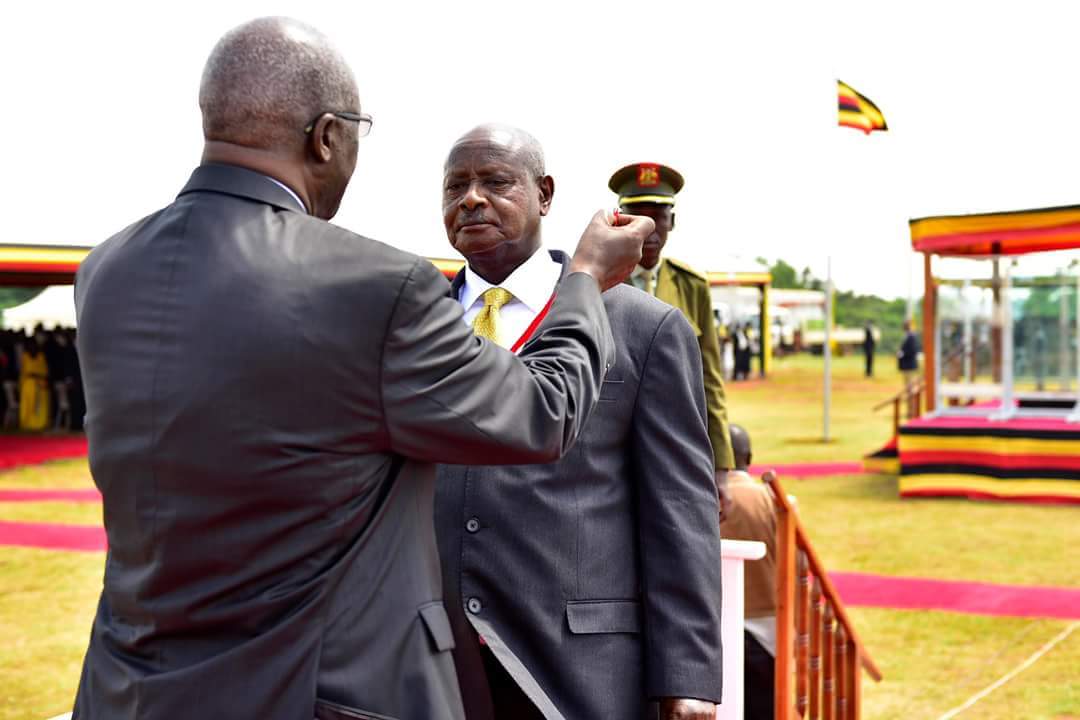
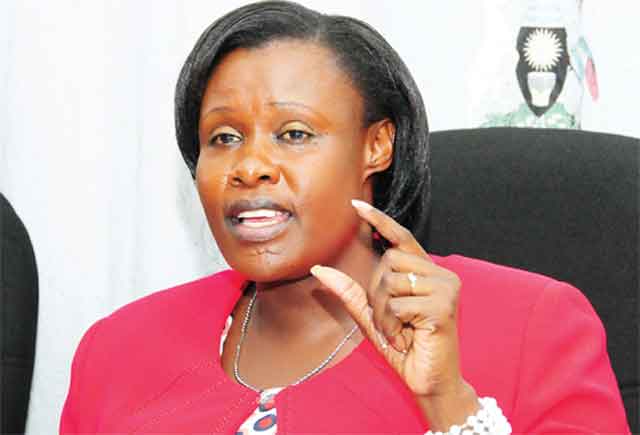

Let me equate UTL(the sleeping Lion) to one of the wives of this powerful man called Government. With all the wives given the entitled allocation while other wives invest, UTL with even second hubby lapGreen a Libyan owned entity chose to spend while the others, NITA-U inclusive invested. To further meet her expensive life style, the would be assets were fraudulently sold out. Take a look at the warehouse in 5th Street, how does it look? The yard near queens way-Nsambya road, the building in Mbuya now housing MTN switch and many other property sold out or neglected across the country. Lets talk moving assets like vehicles/motor bikes, what is their current state? Does the author of the above article know that most UTL sites are switched off due to failure to pay rent to the landlords, old equipment, lack of spares etc? Does the author know that UTL was the first Telecom to lay a fiber network in this Country and install 3G that was never commissioned? Does the author know that UTL is heavily indebted with suppliers that they can no-longer get spares for their legacy equipment, Chinese companies Huawei and ZTE cut out ties due to long over-due payments that they don’t see any chance of recovering. UTL is indebted to all Telcoms in interconnect fees(http://www.monitor.co.ug/Business/Technology/UTL-loses-court-case-pay-billions-in-interconnection-fees/688612-4096122-131q04c/index.html), (http://www.monitor.co.ug/Business/Prosper/How-Utl-got-into-the-current-mess/688616-2663026-ut7783z/index.html), who goes to court knowing they have a case to answer unless he/she is blind enough like UTL to think they can get away with everything? Just a few weeks ago UTL went into war with Roke Telkom over a fiber network they know very well that it isnt theirs(http://www.roketelkom.co.ug/news/mistaken-ownership-fibre-optical-cable-roke-telkom-tells-story/#.WaaG1cztxJs.facebook). Having failed to pay fiberhome that had manufactured fiber cable for them this fiber cable was sold to Roke shamelessly they tried to claim the network. Most clients have terminated their service due to poor service delivery and failure to adhere to SLA. So many clients who were proud to support BUBU have been frustrated for years, when the a service degrades, if its restored at all then its after months for the technicians either do not have a working vehicle, fuel or spares. When one BTS fails they either downgrade or cannibalize another to get spares and when these options fail, the BTS is left malfunctioned becoming the source of spares. In this age when LTE, fiber and IP networks is the talk UTL can only talk copper and 2G. In honest truth how many UTL subscribers do we have? Who are the users of msente except the staff who have no choice but use to receive imprest? The truth is UTL had the capacity way back, they have over time sunk so deep that instead of trying to drag seriously working entities like NITA-U and others into their mess should look at straight clean up, consolidate what they have, show ability to deliver better than other service providers in terms of efficiency, reliability and affordability then stretch to acquire more, for clients will willingly get connected, otherwise Government risks dragging functioning entities like NITA-U and many others down the drainage in attempt to save UTL. Yes NITA-U made several mistakes under the parent ministry ICT in 2007 with phase I of NBI but this was quickly corrected in Phase II and III. I highly believe that Phase IV, V….X will put this Country way above Rwanda and Kenya that are much praised today. While for UCC, the once vibrant Institute in Nakawa sitting on a very prime area is slowly going to the dogs like UTL aka the sleeping Lion, I would suggest that you hand this Institute to NITA-U and you concentrate on ensuring Telecoms dont cheat subscribers, the right content is aired out on both electronic and print media, harmony among the telecoms and ISPs in brief the regulatory work is done without bending the rules. Lastly to the sleeping Lion, behaving like a super wife who can always get big daddy to make orders in your favor to frustrate those who have taken the initiative to plan well is not the best solution here but rather waking up and starting to make good where you went wrong.
Tumwebaze has been fighting to achieve low data costs…The only queries on Ministry of finance’s decision that UTL supplies Internet to all MDAS are;
While it’s s a good promise from UTL to offer cheaper Internet, we need to examine scientifically UTL’s ability to do so sustainably since it has been a player in the telecom market but has not offered the same cheaper Internet? Secondly, govt invested almost $200m dollars in building backbone fibre infrastructure.
The same govt has been buying Internet through the same backbone under NITA. So when now a private operator UTL takes over supply of Internet to govt and resorts back to the private market, what will be the fate of the huge govt investment in the backbone ? Ministry of finance which sits on NITA board and as the Ministry in charge of planning should have advised govt corectly on the rationale of taking up these huge loans to invest in the back borne. If UTL has capacity to offer cheap Internet why can’t they do so on the market and out-compete the other telecoms? Then automatically all businesses both from govt and private people will go to them. A mistake also that was made by govt in 2007 when it borrowed $100m from China Exim bank to finance the backbone was that; It never defined correctly a policy on broadband(Internet) infrastructure.
Telecoms were allowed to continue investing in their own private infrastructure..
When they invest in their own infrastructure, they have to recoup their monies through high data prices..In Ethiopia govt forced all telecoms to use the govt built fibre…It’s not easy to force the telecoms in Uganda to use the government fibre bse they have already invested heavily in theirs. Govt will be sued and forced to compensate them….